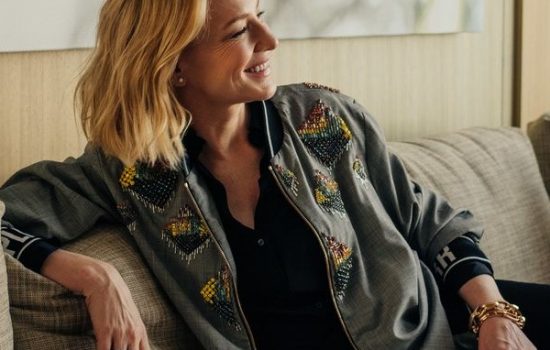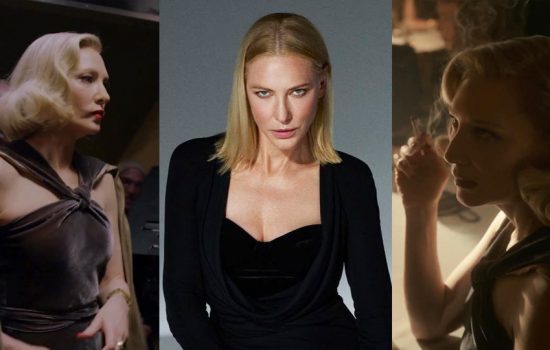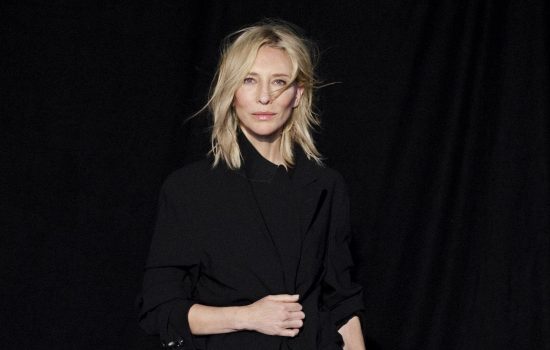A new interview from the Australian promotion of Carol
Cate Blanchett is a formidable actress – but what makes her so appealing is that she is also humble.
Currently starring in Carol, and recently Truth, the Oscar-winning actress is known to be a bit of a chameleon, able to tackle diverse film roles.
Carol is the film adaptation of Patricia Highsmith’s 1950s novel, The Price of Salt, a lesbian love story that was way ahead of its time, starring Blanchett and Rooney Mara, best known for her starring role in The Girl With The Dragon Tattoo.
Blanchett’s stellar roles include portraying Katherine Hepburn in The Aviator at the height of her career fame, and a depressed and delusional upper class woman in Woody Allen’s Blue Jasmine.
In Carol, the scene is Christmas 1950. We meet a quiet, mousy young woman (Mara) who leads a routine life holding down a temporary job in the doll section at a Manhattan department store.
Soon, Carol Aird (Blanchett) steps into this world, an elegant socialite – and the subtle, but apparently natural relationship ensues for the two women from diverse backgrounds.
Q:Your husband, Andrew Upton, is executive producer on the film, and the two of you also ran a theatre company together (Sydney Theatre Company). How do you juggle all that with being parents?
A: A lot of people looked at us in horror when we said we wanted to run a theatre company together. But it seemed like a natural extension. When I met him, I felt I could finally talk to someone about my work and work generally. And you are only as interesting as the people you are talking with. Just talking to him, I found him fascinating. And also we don’t judge each other’s adventures, creative adventures. I love working with him.
Q: And your children, are they involved with this as well, are you like a full-on theatre and film troupe together?
A: Initially we tried to quarantine the children from the unpredictability and vagaries of creative life. But running a theatre company, being backstage is like a big sleepover. They love it. If I was a lawyer, people would think: “Of course my children are going to become members of the bar.” In my case people are saying: “Your children want to be actors.” They have to really want to do it. There has to be a vocation, because there are a lot of pitfalls and rejections along the way.
Q:Please tell me, does it drive you crazy when everybody is singing your praises?
A: That’s what they say to my face. I don’t know what they are saying behind my back.
Q: How does it feel when the talk is about your latest movie, Carol?
A: It has been a long labor of love in particular for Phyllis Nagy, the writer. I have also been attached to the project a long time. And also working like someone with (director) Todd Hayes, it really became a film when he came on board.
Q: Did you find any inspiration in actresses of the time?
A: Todd showed me a film called Lovers and Lollipops, which I had never seen before. It was a revelation. There was a rawness and a really unusual perspective. Also I didn’t know Vivian Mayer’s work, and I saw an extraordinary documentary on her. It had mostly to do with photographs, and there as a transition, because originally in the novel and the screenplay Therese wants to be a set designer and then she becomes a photographer. That became a really important thread in the film. It was not so much the drama of the period but more the images of the period, the music.
Q: Was it difficult to do the love scenes with Rooney Mara?
A: Everyone focuses on the love scenes. I loved working with Rooney. We have the same sort of practicality about work. I have great respect for her. We take the work seriously, but we don’t take ourselves seriously. So I found it very easy to work with her. There are very few actresses who could have created a character as demure and flung out of space as Therese. She has incredible range.
Q: What went on behind the scenes?
A: Well, the great thing that Todd did about the more physical scenes – we did it with all scenes. We talked very much how we are going to shoot the thing, because there is a very clear and shifting perspective in the film … Todd invites you into that world. Rooney and I didn’t talk much around the scenes, but we were very open to each other on the day.
Q: Did the crew take off their clothes?
A: They offered; I said, “please don’t!”
Q: Todd said that you can sometimes be too harsh on yourself on set?
A: It’s sometimes when I think; I can sense what it is but I haven’t quite got there. And you don’t want that to get in the way of anyone else’s work. Sometimes you’ve to just let it go. We haven’t got any more time. That has to be it. But that’s what maybe spurs me on, the thinking that I screwed that up. But that’s not to a neurotic degree.
Q: What do you mean?
A: I am quite practical about my work, but that’s what I love about the theatre. You get a go at it every night and get closer to something that is perfect. That’s the one dissatisfaction I have with filmmaking that it’s often when you reach the end of filming when you think: “Now I know how to do it”.
Q: This part as well?
A: Oh, all the time. That’s why I, apart from having to make a living, keep wanting to work. When I say to myself “I didn’t quite achieve that. Maybe I can investigate that through that role and with that director and that actor.” You don’t quarantine each job.
Q:Does it make a difference when you are playing a real person like Katharine Hepburn in The Aviator?
A: It is when you are playing them in the same medium they are iconically known. I was shitting bricks, pardon my French, but when Scorsese asks you – are you going to say no? The best piece of direction he gave me at the beginning was, you can be blonde. You don’t have to look like her. You look great.
Q: Did you know what he meant by that?
A: What he was basically saying to me was, don’t worry about what people think, don’t worry about looking like her. We just want an energy. And he showed what he did. He said, I want you to look at this film, this film and this film. And through the connective threads I knew what he was trying to show me. He was talking about the energy of the woman. It was not a biopic about Katharine Hepburn, it was about Howard Hughes. And I thought: “He wants me to burst onto screen”.
Q: How important was it for you to have a specific lavish look in your first scene with Rooney?
A: I always find the hair and make-up process that Todd is very involved with a really creative time. Obviously film is a visual medium and people start putting together the psychology of a character before they open their mouths, and so the look of Carol was very important. And then it becomes freed up during the road trip with Therese. Also how Therese becomes more like Carol when she matures after her heart is broken. But I didn’t want to become too wound up in looking so-called beautiful. It was also an energy production thing. It was also about trying to create a mystique or ambiguity around Carol and (an) unknowability around her without making her alienating … still having that remoteness that exists within the novel. It’s also about sexual allure. That’s why I was cast first! Yes, because that’s in the gaze. I can act sexual allure ‘til my pants fall down. That’s in the filmmaking, and that’s where Todd was really great. He was holding our hand along the way as we were making it together. I knew what frame I was in, and that was helpful.
Q: What about Variety claiming that you had lesbian relationships?
A: It was not necessarily Variety. It’s the down side of the internet. Internet is a fantastic tool, but it’s also like the back of a toilet door. Something gets said and then it’s these whispers. Who I am is of far less interest than the film Todd Haynes has made. Am I gay? Not yet! We are pointing at the ’50s and yet we are acting as if it mattered. But this also points to an obsession that we have if actors are to truly connect to a role, they have to live it. And your job as an actor is to transport the audience to make it feel it couldn’t be any other way. That is the part that I love, you get to inhabit. What my sexual persuasion is, what my politics are, that’s of absolutely no interest.
Q: In what ways is this movie about gay characters relevant to our period of time?
A: There are many countries around the world where homosexuality is still illegal. What makes the film so special is that Todd thinks like an outsider, which is what makes his relationships and his perspective on the world as a filmmaker so surprising and arresting. He’s described it as Romeo and Juliet, or rather Juliet and Juliet. These characters are falling in love for the first time. Yes, it’s important it’s two women falling in love but it also describes the experience when you are connecting with someone deeply. The characters find that dangerous, not only because the love that they feel is illegal, but because it’s so alarming for them.
Q: How important was it for you to know the social and legal context of this story?
A: It was absolutely vital. We did a political timeline and a social mores timeline from the end of the Second World War until the beginning of the ’60s. You are dealing with a decade. The ’50s are not a homogeneous blob. In the Second World War, women took on a lot of masculine roles they didn’t previously get the opportunity to do and then they were back in the kitchen and then you’ve got the Cold War and nuclear technology, you’ve got the subterranean nature of American politics. And also knowing that same-sex love is illegal.
Q: Can a character be a challenge to you personally?
A: Definitely. There is a little residue of a character that stays with you. I can’t say what it is. But that’s what the pleasure of being an actor is, you get a little bit expanded. It’s like the more novels of great writers that you read, the more your sense of the world expands, the more great roles you get to play and the people you get to be in creative conversation with, the more your sense of the world gets expanded and the residue stays with you.
via Adelaide Now
 Welcome to Cate Blanchett Fan, your prime resource for all things Cate Blanchett. Here you'll find all the latest news, pictures and information. You may know the Academy Award Winner from movies such as Elizabeth, Blue Jasmine, Carol, The Aviator, Lord of The Rings, Thor: Ragnarok, among many others. We hope you enjoy your stay and have fun!
Welcome to Cate Blanchett Fan, your prime resource for all things Cate Blanchett. Here you'll find all the latest news, pictures and information. You may know the Academy Award Winner from movies such as Elizabeth, Blue Jasmine, Carol, The Aviator, Lord of The Rings, Thor: Ragnarok, among many others. We hope you enjoy your stay and have fun! 



 A Manual for Cleaning Women (202?)
A Manual for Cleaning Women (202?) The Seagull (2025)
The Seagull (2025) Bozo Over Roses (2025)
Bozo Over Roses (2025) Black Bag (2025)
Black Bag (2025)  Father Mother Brother Sister (2025)
Father Mother Brother Sister (2025)  Disclaimer (2024)
Disclaimer (2024)  Rumours (2024)
Rumours (2024)  Borderlands (2024)
Borderlands (2024)  The New Boy (2023)
The New Boy (2023) 











